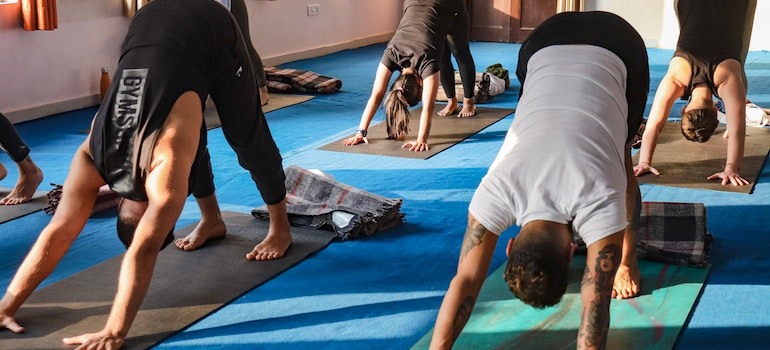Getting clean and maintaining sobriety can be daunting tasks. Yet, integrating exercise into your healing process can make a world of difference. At Harmony Ridge Recovery Center WV, we believe a multi-faceted approach—blending physical, psychological, and social wellness—is essential for true recovery. Exercise for recovery and sobriety isn’t merely about physical exertion; it’s an empowering tool for life transformation.
Benefits of Exercise in Recovery
Taking the plunge to get clean involves more than just kicking a habit; it’s about rebuilding yourself from the ground up. Exercise is a compelling tool, providing wide-ranging benefits that touch your well-being. Below, we delve into these advantages, categorized into:
- Physical benefits
- Psychological benefits
- Social elements

Physical Benefits
Firstly, exercise releases endorphins, your body’s natural mood elevators. These chemicals reduce stress and enhance sleep quality, empowering you to tackle daily challenges more effectively.
Psychological Benefits
Beyond the physical gains, exercise does wonders for your mind. It boosts your self-esteem and is a natural remedy for cravings, helping you focus squarely on recovery.
Social Benefits
Group exercises and team sports help build a community around you, reinforcing accountability and commitment to your recovery goals. Besides that, looking good can translate into feeling good, making you more socially confident and approachable, thus enriching your relationships and widening your support network.
Tailoring Exercise to Individual Needs
Recovery is deeply personal, and your exercise regimen should be too. At Harmony Ridge, we provide holistic therapy for addiction that includes customized exercise plans. We assess your unique needs, interests, and medical history to guide you toward activities that resonate with you. We support your journey whether you’re inclined toward brisk walks or prefer strength training.
Overcoming Barriers to Exercise
Starting to exercise can be tough, especially when you’re also dealing with cravings and emotional upheaval. Remember, it’s okay to feel resistant. The key is to take small, incremental steps. You don’t have to run a marathon on day one; sometimes, a short walk around the block is a victory.

Begin with manageable goals to avoid overwhelming yourself. For instance, aim for a 10-minute walk today and maybe 15 minutes tomorrow. Slowly but surely, you’ll build up your endurance and confidence.
Your mind can be your best friend or your worst enemy. To overcome initial hesitations, cultivate a mindset of self-compassion and gradual progress. This way, even if you stumble, you’re not falling off the path to recovery; you’re learning how to navigate it.
Exercise for Recovery and Sobriety as Part of a Comprehensive Strategy
Being addicted to harmful substances often requires a multi-pronged approach to recovery. Incorporating exercise is powerful, but coupling it with other therapies can make your recovery more robust.
At Harmony Ridge, we specialize in therapy for addiction that incorporates counseling, medical treatment, and other forms of social and psychological support.
Benefits of Exercise for Different Substances
Each journey has its unique set of challenges when it comes to recovery from different substances. Yet, exercise remains a versatile tool, adaptable for various kinds of recovery, including:
- Benzodiazepines
- Cocaine
- Fentanyl
Here’s how exercise can be particularly beneficial in the context of these substances.
Benzodiazepine Recovery
If you are going through the complex world of benzo detox, you’re likely grappling with anxiety and sleep issues. Exercise can manage these symptoms by releasing calming endorphins and improving sleep patterns.
Cocaine Recovery
Withdrawal from cocaine often triggers depression and mood swings. Exercise can be a natural mood enhancer, boosting dopamine levels and counteracting emotional lows. It’s one reason many consider us a reliable cocaine addiction treatment center.
Fentanyl Recovery
Managing fentanyl detox is daunting, fraught with physical pain and mood fluctuations. Exercise can alleviate these symptoms by enhancing mental resilience and acting as a natural pain reliever.
Types of Exercise for Recovery and Sobriety
Exercise doesn’t have to mean hours at the gym. You have a variety of different options to choose from:
- Cardiovascular Activities: Running, walking, and swimming are great for boosting your heart rate and improving overall health.
- Strength Training: Activities like weightlifting or bodyweight exercises can build muscle and improve physical strength.
- Mind-Body Activities: Yoga, Tai Chi, and Pilates offer a blend of physical and mental benefits, perfect for a balanced approach to recovery.

Creating a Sustainable Routine
Sticking to an exercise regimen is often easier said than done, especially when navigating the challenges of a fentanyl detox center program. Consistency is the key, not just in your workouts but also in your overall recovery strategy. At Harmony Ridge, we understand that sustainability is a crucial factor, and we’re committed to helping you create a long-lasting exercise routine that aligns with your life and recovery goals.
Building a Supportive Community
Community plays a significant role in making any recovery sustainable. Whether it’s family, friends, or fellow recoverees, having a support network can amplify the benefits of your exercise regimen. Engage in group activities like team sports or shared fitness classes. The camaraderie makes the workouts more enjoyable and holds you accountable.
Monitoring Progress and Celebrating Achievements
Regularly tracking your exercise milestones can keep you motivated. Use fitness trackers, journaling, or progress photos as tangible evidence of your improvements. And don’t forget to celebrate your achievements, no matter how small. Every step forward is a small victory.

Harness the Power of Exercise for Recovery and Sobriety
Exercise for Recovery and Sobriety is not a one-size-fits-all solution but a universal tool that can empower anyone willing to wield it. From managing withdrawal symptoms to building a community, the benefits are as comprehensive as they are impactful. Take that first step today, and let’s walk this path together toward a healthier, happier you.



